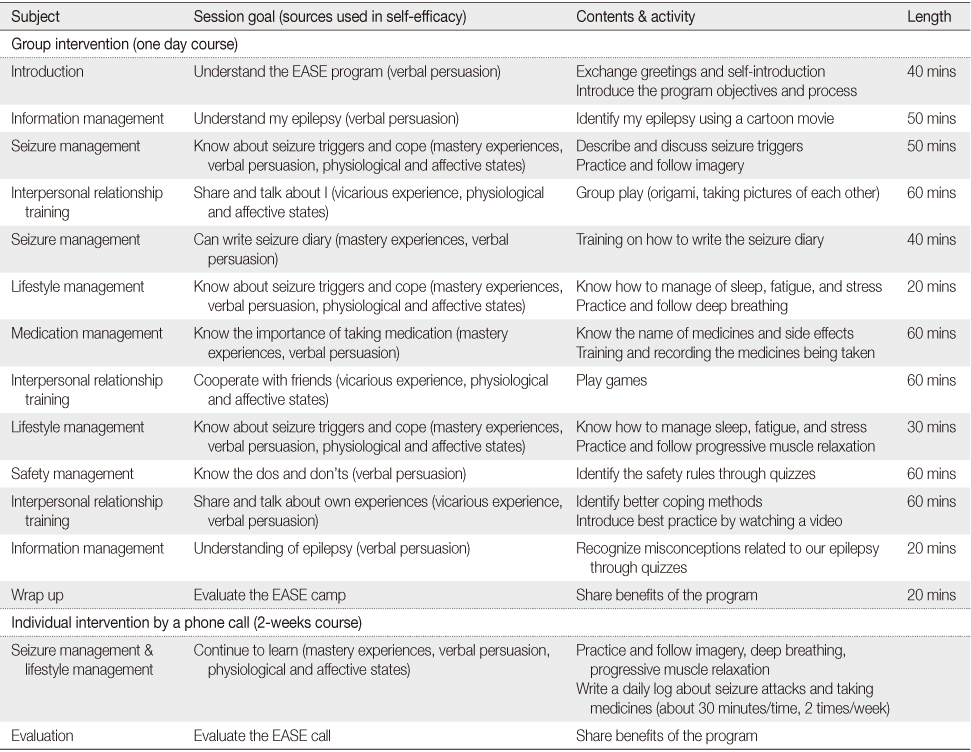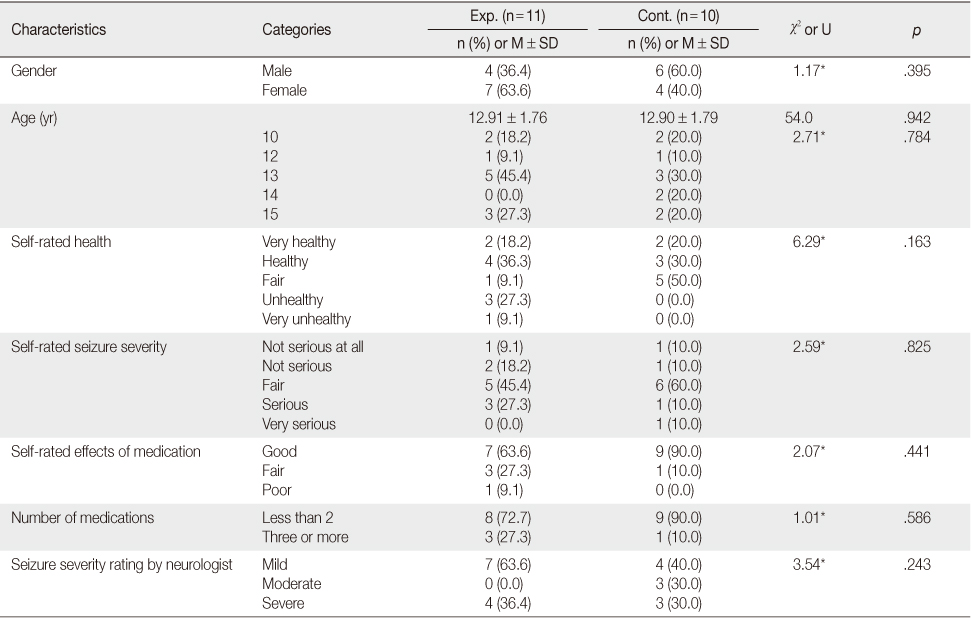Articles
- Page Path
- HOME > J Korean Acad Nurs > Volume 45(1); 2015 > Article
-
Original Article
- Development and Evaluation of the Empowering A Self-Efficacy (EASE) Program for Children with Epilepsy
- Hana Yoo, Hee-Soon Kim
-
Journal of Korean Academy of Nursing 2015;45(1):54-63.
DOI: https://doi.org/10.4040/jkan.2015.45.1.54
Published online: February 27, 2015
1Department of Nursing, Korean Bible University, Seoul, Korea.
2College of Nursing·Nursing Policy Research Institute, Yonsei University, Seoul, Korea.
- Address reprint requests to: Yoo, Hana. Department of Nursing, Korean Bible University, 32 Dongil-ro (st) 214-gil, Nowon-gu, Seoul 139-791, Korea. Tel: +82-2-950-5501, Fax: +82-2-950-5484, hanay@bible.ac.kr
© 2015 Korean Society of Nursing Science
This is an Open Access article distributed under the terms of the Creative Commons Attribution NoDerivs License. (http://creativecommons.org/licenses/by-nd/4.0/) If the original work is properly cited and retained without any modification or reproduction, it can be used and re-distributed in any format and medium.
Abstract
-
Purpose
- The purpose of this study was to verify effects of the Empowering A Self-Efficacy (EASE) program on self-efficacy, self-management, and child attitude toward illness in children with epilepsy.
-
Methods
- This was a quasi-experimental study with a non-equivalent control group pre-post test design. Participants were 10 to 15 year old children with epilepsy (11 in the experimental group and 10 in the control group) who were registered at one hospital in S city. The experimental group received the EASE program for 3 weeks. In the first week, a group meeting lasting 570 minutes was conducted on a single day. Over the next two weeks, telephone counselling was conducted twice a week. Data were analyzed using SPSS 18.0.
-
Results
- There was a significant difference of pre-post evaluation of the epilepsy self-management scores in the experimental group. However, differences between the experimental group and the control group for seizure self-efficacy and child attitude toward illness were not significant.
-
Conclusion
- This is the first study in Korea to develop and evaluate an intervention program for children with epilepsy. Further studies are needed to confirm the effects of the EASE program.
- 1. Lee BI. Epilepsy: Epidemiology and classification. J Korean Med Assoc. 2003;46(4):269–278. Article
- 2. Ministry of Health & Welfare, Korea Centers for Disease Control & Prevention. Korea health statistics 2009: Korea national health and nutrition examination survey (KNHANES IV-3). Seoul: Ministry of Health & Welfare; 2010.
- 3. Austin JK, Huster GA, Dunn DW, Risinger MW. Adolescents with active or inactive epilepsy or asthma: A comparison of quality of life. Epilepsia. 1996;37(12):1228–1238.ArticlePubMed
- 4. Sbarra DA, Rimm-Kaufman SE, Pianta RC. The behavioral and emotional correlates of epilepsy in adolescence: A 7-year follow-up study. Epilepsy Behav. 2002;3(4):358–367.ArticlePubMed
- 5. Moon SM. Psychosocial adjustment process in adolescents with epilepsy. J Korean Acad Nurs. 2005;35(1):16–26.ArticlePDF
- 6. Kim MA, Shin Y, Park YS, Kim YH, Kim HS. Development of an educational program for parents of children with epilepsy. J Korean Acad Fundam Nurs. 2003;10(3):335–344.
- 7. Park YS. The effects of a epilepsy education program on self efficacy and self management in patients with epilepsy. J Korean Acad Nurs. 1999;29(2):405–417.ArticlePDF
- 8. Shin SO. The effects and development of a comprehensive health education program on improvement of quality of life in epileptic patient [dissertation]. Seoul, Yonsei University. 2002.
- 9. Jantzen S, Müller-Godeffroy E, Hallfahrt-Krisl T, Aksu F, Püst B, Kohl B, et al. FLIP&FLAP-a training programme for children and adolescents with epilepsy, and their parents. Seizure. 2009;18(7):478–486. ArticlePubMed
- 10. Lewis MA, Salas I, de la Sota A, Chiofalo N, Leake B. Randomized trial of a program to enhance the competencies of children with epilepsy. Epilepsia. 1990;31(1):101–109.ArticlePubMed
- 11. Rau J, May TW, Pfäfflin M, Heubrock D, Petermann F. Education of children with epilepsy and their parents by the modular education program epilepsy for families (FAMOSES)-results of an evaluation study. Rehabilitation (Stuttg). 2006;45(1):27–39. PubMed
- 12. Snead K, Ackerson J, Bailey K, Schmitt MM, Madan-Swain A, Martin RC. Taking charge of epilepsy: The development of a structured psychoeducational group intervention for adolescents with epilepsy and their parents. Epilepsy Behav. 2004;5(4):547–556. ArticlePubMed
- 13. Tieffenberg JA, Wood EI, Alonso A, Tossutti MS, Vicente MF. A randomized field trial of ACINDES: A child-centered training model for children with chronic illnesses (asthma and epilepsy). J Urban Health. 2000;77(2):280–297. ArticlePubMedPMCPDF
- 14. Wagner JL, Smith G, Ferguson P, van Bakergem K, Hrisko S. Pilot study of an integrated cognitive-behavioral and self-management intervention for youth with epilepsy and caregivers: Coping openly and personally with epilepsy (COPE). Epilepsy Behav. 2010;18(3):280–285. ArticlePubMed
- 15. Conant KD, Morgan AK, Muzykewicz D, Clark DC, Thiele EA. A karate program for improving self-concept and quality of life in childhood epilepsy: Results of a pilot study. Epilepsy Behav. 2008;12(1):61–65. ArticlePubMed
- 16. Glueckauf RL, Fritz SP, Ecklund-Johnson EP, Liss HJ, Dages P, Carney P. Videoconferencing-based family counseling for rural teenagers with epilepsy: Phase 1 findings. Rehabil Psychol. 2002;47(1):49–72. Article
- 17. Yoo H, Yun OB. Trends of research on the effects of psychosocial intervention for children with epilepsy: Systematic review. J Korea Contents Assoc. 2014;14(6):219–228. Article
- 18. Shin YH. Children with epilepsy: Quality of life and management. Korean J Child Health Nurs. 2004;10(2):225–232.
- 19. Buelow JM, Johnson J. Self-management of epilepsy: A review of the concept and its outcomes. Dis Manag Health Outcome. 2000;8(6):327–336.
- 20. Dilorio C, Faherty B, Manteuffel B. Self-efficacy and social support in self-management of epilepsy. West J Nurs Res. 1992;14(3):292–303.ArticlePubMedPDF
- 21. Faherty B, Dilorio CK. The development and testing of an instrument to measure self management in persons with epilepsy. In: Paper presented at: Fifth Annual Conference of the Southern Nursing Research Society. 1991 February 28-March 2; Richmond, VA.
- 22. Bandura A. Self-efficacy: The exercise of control. New York, NY: W.H. Freeman; 1997.
- 23. Austin JK, Huberty TJ. Development of the child attitude toward illness scale. J Pediatr Psychol. 1993;18(4):467–480.ArticlePubMed
- 24. Caplin D, Austin JK, Dunn DW, Shen J, Perkins S. Development of a self-efficacy scale for children and adolescents with epilepsy. Children Health Care. 2002;31(4):295–309. Article
- 25. Austin JK, Dunn DW, Perkins SM, Shen J. Youth with epilepsy: Development of a model of children's attitudes toward their condition. Children Health Care. 2006;35(2):123–140.Article
- 26. In: Fox JA. editor. Primary health care of infants, children, & adolescents. 2nd ed. St. Louis, MO: Mosby; 2002.
- 27. Gu MO, Yu JS, Kweon IK, Kim HW, Lee EO. A review of research on self efficacy theory applied to health related behavior. J Nurs Acad Soc. 1994;24(2):278–302.ArticlePDF
- 28. Cha BK, Chang HK, Sohn JN. A meta-analysis of the effects of a self-efficacy promoting program. J Korean Acad Nurs. 2004;34(6):934–944.ArticlePDF
- 29. DiIorio C, Shafer PO, Letz R, Henry TR, Schomer DL, Yeager K. Project EASE: A study to test a psychosocial model of epilepsy medication management. Epilepsy Behav. 2004;5(6):926–936.ArticlePubMed
REFERENCES
Figure & Data
REFERENCES
Citations

- Concept Analysis of Self-management in Children with Chronic Kidney Diseases through Walker and Avant’s Method
Sug Young Lee
Journal of Korean Academy of Fundamentals of Nursing.2025; 32(1): 105. CrossRef - Service delivery, behavioural, and self-management interventions for children with epilepsy
Nigel Fleeman, Josephine Mayer, Yun Huang, Sarah J Nevitt, Mariangela Panebianco, Ruaraidh A Hill, Alison J Doherty, Neil Wilson, Paul Boland, Andrew J Clegg, Helena Bilsborough, Elsie J Williams, Elizabeth J Shaw, Michelle Maden, Rachael Kelly, Anthony G
Cochrane Database of Systematic Reviews.2025;[Epub] CrossRef - Developing and evaluating an evidence-based practice research competency enhancement program for clinical nurses in Korea: a pilot study
Suhyun Kim, Hye Won Jeong
BMC Nursing.2024;[Epub] CrossRef - The effectiveness of an individual and family self-management theory-based education program given for adolescents with epilepsy and parents: Randomized controlled trial
Hilal Kurt Sezer, Sibel Küçükoğlu, Abdullah Canbal
Journal of Pediatric Nursing.2024; 79: 171. CrossRef - Psychological treatments for people with epilepsy
Rosa Michaelis, Venus Tang, Sarah J Nevitt, Janelle L Wagner, Avani C Modi, William Curt LaFrance Jr, Laura H Goldstein, Milena Gandy, Rebecca Bresnahan, Kette Valente, Kirsten A Donald, Markus Reuber
Cochrane Database of Systematic Reviews.2020;[Epub] CrossRef - Evaluation of the efficiency of the web-based epilepsy education program (WEEP) for youth with epilepsy and parents: A randomized controlled trial
Şerife Tutar Güven, Ayşegül İşler Dalgiç, Özgür Duman
Epilepsy & Behavior.2020; 111: 107142. CrossRef - The Effect of Educational Program on Self-Management of Patients with Epilepsy: A Randomized Clinical Trial Study
Narges Bahiraei, Maryam Dehghani, Alice Khachian
Avicenna Journal of Nursing and Midwifery Care.2019; 27(5): 361. CrossRef - Self-Management Experiences of the Adolescents with Chronic Kidney Disease
Sug Young Lee, Heesun Shin
Journal of Korean Academy of Nursing.2018; 48(3): 266. CrossRef
Empowering A Self Efficacy (EASE) Program
Homogeneity Test of General Characteristics of the Participants (N=21)
*Fisher's exact test. Exp.=Experimental group; Cont.=Control group.
Homogeneity Test of Dependent Variables of the Participants (N=21)
Exp.=Experimental group; Cont.=Control group.
Comparison of Scores between Pretest and Posttest for the Participants (N=21)
Exp.=Experimental group; Cont.=Control group.
*Fisher's exact test. Exp.=Experimental group; Cont.=Control group.
Exp.=Experimental group; Cont.=Control group.
Exp.=Experimental group; Cont.=Control group.
 KSNS
KSNS
 E-SUBMISSION
E-SUBMISSION




 Cite
Cite

